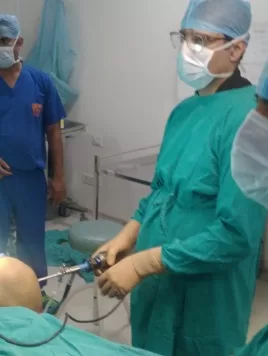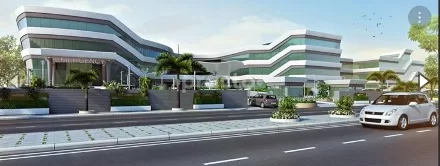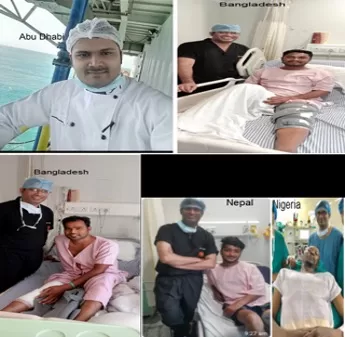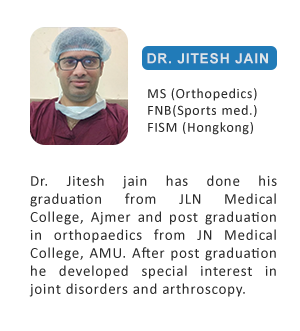Best ACL Surgeon in Jaipur
ACL reconstruction is surgery to replace a torn ligament which is called the anterior cruciate ligament (ACL). If you live in Jaipur and you are looking for the Best ACL Surgeon in Jaipur, then this article is for you.
ACL ligament surgery has evolved in the last decade, and no other surgery has seen so many technical modifications as ACL surgery.
Initially, bone Patellar tendon-bone graft was the gold standard in ACL reconstruction. The first publication describing a technique using both the semitendinosus and gracilis was that of Lipscomb B. in 1982. Now the use of the Hamstring tendon is the surgeon’s favourite.

Dr Jitesh Jain doing ACL knee surgery.
Dr. Jitesh Jain – Best ACL Surgeon in Jaipur
Dr Jitesh Jain in Rajasthan hospital, Jaipur is the only national board fellowship-trained arthroscopic surgeon in Jaipur. He works as Consultant, Joint replacement and arthroscopic Surgeon at Rajasthan hospital. He has rich experience in treating more than 1000 knee and shoulder arthroscopic surgeries. He is one of the top orthopaedic surgeons in Jaipur.
RHL Rajasthan Hospital: A leading name in arthroscopic surgeries for knee and shoulder problems.

Rajasthan hospital: Only centre in Rajasthan where international patients come for arthroscopic surgery for their shoulder and knee ligament injuries.
Arthroscopic surgery specialist Dr Jitesh Jain is a leading name in the treatment of sports and ligament injuries and is considered the best ACL surgeon in Jaipur. RHL Rajasthan hospital serves patients from all over India. It’s a trusted name for joint replacement and arthroscopic surgeries for ligament injuries among international patients.
International Patients
Not only from India, Dr. Jitesh Jain treats patients from all over the world.

What’s new in ACL Surgery?
1. ALL INSIDE ACL RECONSTRUCTION and INTERNAL BRACING :
All-inside ACL is an upcoming technique to reconstruct a torn ACL with many potential advantages
- Its more bone preserving in nature, as only partial length sockets are cut rather than complete length tunnels as in conventional ACL reconstruction.
- Reduced postoperative pain as there is minimal periosteal disruption at tunnel ends (as ends are not reamed). This allows for faster Rehabilitation and earlier return to sports for the sportsman.
- Smaller skin incision as only SemiT has to be harvested.
- Since ACL is reconstructed using only Semitendenosus and the spared gracilis tendon (hamstring) leaves the leg with greater hamstring strength shielding the graft
- Visualization during femoral tunnel insertion is easier as one may not need to flex beyond 90 degrees to get the desired trajectory
- A fibertape can also be used to augment graft (internal brace) as in suspensory fixation differential tensioning of both graft and tape is possible.
Limitations are very few. The technique has a small learning curve. Since there are no tunnels exiting the cortex, the graft has to be introduced in sockets by making it enter the knee via Antero medial portal. Hence the portal incision has to be slightly larger to introduce graft (rather a passport cannula should be placed to ascertain smooth passage).
2. NASA technique: Nine mm Anatomical Screwless All inside ACL reconstruction
Dr. Jitesh has experience of the arthroscopic reconstruction of more than 1000 ACL tears. After years of experience, he has devised a technique of ACL reconstruction (NASA technique) which is safe, reproducible and has a high success rate.
What is NASA technique?
N stands for Nine mm thick graft. Many studies have proven that graft thinner than 8mm has a high failure and retear rate compared to 8mm or thicker grafts. In NASA technique single hamstring tendon (Semitendinosis) is enough to make 9mm thick ACL graft.
A stands for anatomical reconstruction. In the NASA technique tunnels are made directly in the residual stump of the native ACL. This places a new graft in the anatomical position which gives the best biomechanics of the knee joint.
S stands for screw-less ACL reconstruction. ACL graft requires some sort of fixation in the tunnels. Using screws to fix the graft is not free from complications. These complications include the loosening of screws, screw impingement into the joint, graft damage by the screws, and tissue reactions around bio and metal screws. In the NASA technique no screw is used and the graft is fixed with 2 adjustable loops. This avoids screw-related complications after ACL reconstruction
A stands for All inside ACL reconstruction. In conventional ACL reconstruction, 2 hamstring grafts (semi tendinosis and Gracilis) are used and long bony tunnels are made. In Asian patients, even 2 hamstring grafts are not sufficient to make a 9 mm thick graft many times. Long bony tunnels cause unnecessary loss of bone stock and more pain after surgery. Harvesting both hamstrings can reduce the strength in deep knee bending and this may weaken the flexion strength in sports persons. In the NASA technique, only one hamstring graft is taken to make the graft and a single graft is sufficient to produce a 9mm thick graft. Another benefit of the NASA technique is short tibial tunnel which causes less pain and swelling in helps quick recovery.
X-ray after NASA technique: short tunnels, screwless
3. Use of Allograft
Summary
An ACL injury can be a life-changing event. Getting the proper treatment at the right time is essential. The success and recovery of ACL surgery depend on the expertise of your surgeon. We hope with the information provided in this article your search for the best ACL surgeon in Jaipur ends.
ABOUT THE AUTHOR

TESTIMONIAL

मेरा दाए पैर में चोट लगने के कारण टेढ़ा हो गया था जिसकी वजह से मुझे चलने में भी परेशानी हो रही थी. डॉ जितेश ने ऑपरेशन कर के इसे सीधा किया. में बिलकुल ठीक हूँ .

मेरी बेटी के घुटने में इन्फेक्शन होने के कारण वो दर्द की वजह से सो भी नहीं पाती थी. डॉ जितेश ने ऑपरेशन कर के इसे ठीक किया. बहुत धन्यवाद।

I remember that Dr. Jain came out from his clinic to see my mother because my mother was not able walk a single step. He did total knee replacement on both side and now my mother is walking without aid.
OPENING HOURS
| Monday – Friday | 17:00 – 20:00 |
| Sunday | OFF |
